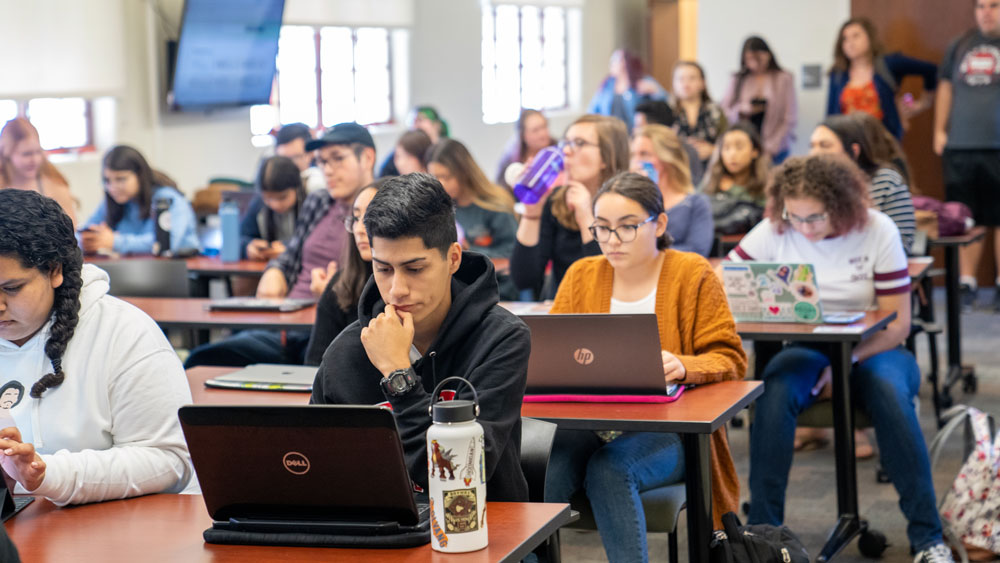As 2019 Teaching and Learning Innovations Fellows, we set out to look more closely at how we could better support students’ transitions from high school to college writing and propel students to success at the university and beyond. As part of this work, we asked students in our first-year composition courses to interview one another, on camera, about their experiences in the first semester at CSUCI. The responses revealed illuminating patterns we are sharing in a series of blog posts. We’ll begin with responses to our first two questions.

What do you wish you’d known at the beginning of the semester?
Perhaps not surprisingly, time management (or lack thereof) was a repeated refrain in these interviews. First time freshmen were challenged to manage the hours of unstructured time they were afforded in college compared to high school and surprised by how quickly the semester flew by. “If I had known that I really could not waste any time,” observed one first-year student, “I would have tried harder to not procrastinate.” We spent time in our class on time management as a lifelong skill and will continue to do so, knowing how vital it is to the success of our students as they juggle myriad responsibilities.
Students also wished they were more adept at what might be perceived as fundamental learning skills, including how to take notes while still listening to their instructor or how to study effectively. Just as we would argue for the value of integrating low stakes writing across disciplines, we also think it is worthwhile for faculty to take some time, especially in introductory classes, on note-taking and study strategies that would most support student learning in those courses.
Along these lines, students would have liked to have known sooner about resources and services available on campus—including the Writing and Multiliteracy Center and the Learning Resource Center as well as Counseling and Psychological Services—so that they could have taken advantage of them earlier. We found that sending students on “field trips” around campus was one way of helping them learn more about these resources, as much as they did not always look forward to these mandatory excursions. They did seem to enjoy them more when working with a buddy, which we will keep in mind for future classes.
As much as we may feel we are constantly touting campus resources in our classes and syllabi, making sure new students see them first-hand, early on, can help them know where to find help when they really need it. As one student lamented, by the time she realized where she could go for help, it was near the end of the semester, and appointments had become much more limited.
What advice would you offer a high school senior who’s thinking about applying to college, but is afraid of what college might be like?
“Don’t be afraid.” This sentiment was echoed among new college students who wanted their high school counterparts to meet fall college application deadlines so that they wouldn’t be left with regret in the spring when their peers were deciding which schools they would attend. While we are cognizant of the anxiety around being admitted to college, we hadn’t really considered that just completing and submitting the application was a threshold that some were afraid to cross. “Don’t get too into your head about things” advised one first-year college student. “It seems scary — I know that for sure ‘cause I never thought I’d end up here – but it’s definitely better than any other school experience you’ll probably have.”
Interviewees also emphasized the importance of applying for scholarships even if a prospective student doesn’t think they will qualify (rather than not applying and eliminating the opportunity altogether). In addition, students communicated that the college experience is not as intimidating as high schoolers might anticipate. It’s not as scary as everybody makes it seem,” one student noted. “Yeah, there might be some late nights, or one assignment that takes you longer than you wished, but it’s nothing you can’t handle.” Many indicated that faculty accessibility and support was integral to making college much more manageable and enjoyable than they had expected. [More about the importance of faculty in Part II.]
Students also reinforced the value of the new friendships and experiences that college offered them. One student expressively spoke of how “liberating” college was in comparison to the often constrictive and judgmental social dynamics of high school: “I found that there was more to me and that the world wasn’t full of awful people, and that there are people who actually appreciate me for who I am.” As much as the experiences of today’s college students seem to diverge from what many of us recall from our own college years, it was reassuring to discover that these core elements remain significant for our students and that they are able to find belonging and community whether they live on campus or commute.
Coming up in Part II of our First-Year Student Reflections:
- What fears did you have about college that turned out not to be true?
- What have you learned about yourself this semester that’s surprised you?
- When you look to your future, what would make you the most proud?